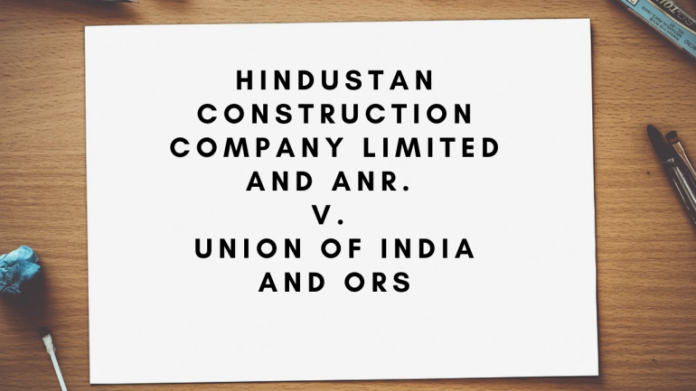This article is written by Mridul Tewari, pursuing a Certificate Course in Arbitration: Strategy, Procedure and Drafting from LawSikho.com.
Table of Contents
Introduction
Even though the purpose of arbitration is to keep the issue out of judicial intervention and fast track the dispute resolution process, with the insertion of Section 87 and revocation of Section 26 in the Arbitration & Conciliation Act 1996 (hereinafter referred to as the “Act”), it may not be possible to do so. The provision for an automatic stay of the arbitral award was not there in the original Act and it was introduced in Section 36 of the Act by Apex Court’s judgment in NALCO and Fiza Developers cases.
The insertion of Section 87 and the revocation of Section 26 by the Arbitration & Conciliation (Amendment) Act, 2019 brought back the same arbitrariness in the Act which existed prior to the 2015 amendment of the Act. Prior to the 2015 amendment, the minute an application was filed under Section 34 of the Act, the award stayed automatically and the award holder had to face a difficult time realising their dues from the award debtors. This arbitrariness in the statute was corrected by the 2015 amendment to the Act but was brought back when Section 87 was inserted and Section 26 was repealed by the 2019 amendment. The object of this article is to analyse the author’s understanding of the Supreme Court’s judgment in Hindustan Construction Company Limited & Anr. v. Union of India & Ors. (2019).
Having a look at the facts of the case
- The petitioners who were construction companies and had undertaken large scale infrastructure building projects such as roads, bridges, hydropower, and nuclear plants, tunnels and rail facilities, etc. as contractors for government bodies, were aggrieved by the fact that whenever there was a cost overrun it was disputed by the government bodies which led to a delay in the recovery of their legitimate dues which could only be recovered through arbitration or through civil proceedings.
- Further, if an arbitral award(s) was in the petitioners’ favour, the government bodies challenged it under Section 34 and Section 37 of the Act leading to the automatic stay of such award(s).
- Moreover, the government bodies being statutory bodies were out of the scope of the Insolvency & Bankruptcy Code, 2016 (IBC) but the petitioners were not exempted from the IBC.
- This made matters worse for the petitioners as on one hand, they could not recover their dues from the government bodies through insolvency proceedings but on the other hand, the petitioners’ creditors could recover their dues from the petitioners through insolvency proceedings.
Issues raised in this matter
- Whether Section 87 of the Arbitration and Conciliation Act, 1996 is constitutionally valid or not?
- Whether the 2019 amendment to the Arbitration and Conciliation Act, 1996 encroached upon the judgment of the court in BCCI v. Kochi Cricket Pvt. Ltd.(2018) or not?
The contentions of the parties
Arguments advanced by the petitioners : matters becoming worse for them
- The petitioners contended that Section 36 of the Act, despite being based on Section 36 of the Model UNCITRAL Law, was contrary to it, because unlike Section 36 of model UNCITRAL Law, Section 36 of the Act, when constructed with various judgments of the Supreme Court, provided for an automatic stay of arbitral awards the minute an application is filed under Section 34. Thus, such judgments need to be revisited by a larger bench.
- Even though the arbitrariness in the Act was removed by the 2015 amendment, the Government of India issued a press release on 07.03.2018 to enact the new Section 87 based on the recommendations of Justice B.N. Srikrishna Committee (Srikrishna Committee) which in its report submitted on 30.07.2017 recommended that the 2015 amendment Act should not apply to pending court proceedings which have commenced after 23.10.2015 and should only apply in case arbitral proceedings which have themselves commenced post 23.10.2015(including the court proceedings).
- They said that the Government inserted Section 87 in the Act by the 2019 amendment despite the fact that the SC while deciding upon the case of BCCI v. Kochi Cricket Pvt. Ltd.(2018) also reviewed the recommendations of the Srikrishna Committee and opined in the said judgment that the aforesaid provision would be contrary to the object of the 2015 amendment Act and also sent the judgment to the Ministry of Law and Justice and the Attorney General for India.
- They contended that due to this retrospective resurrection of this automatic stay, all the award debtors who have challenged the arbitral awards and have made payments to the award holders will now claim the award back.
- The petitioners contended that Section 87 is nothing but a direct attack on the judgment of the SC in BCCI v. Kochi Cricket Pvt. Ltd.(2018).
- They also contended that in addition to being contrary to the object of the Act, Section 87 also violates Articles 14,19(1)(g), 21, and 300-A of the Constitution of India.
- It was also contended that though in a civil appeal there is no automatic stay of a money decree, in arbitration proceedings an award is automatically stayed the minute an application is filed under Section 34.
- The petitioners also challenged the IBC on the grounds that the definition of a corporate person under Section 3(7) of the IBC did not include government bodies.
- They also contended that when read with various provisions of the IBC, Section 87 leads to an absurd outcome i.e. insolvency of the award holder.
The case contended by the respondents
- The respondents defended the insertion of Section 87 and the revocation of Section 26 by the 2019 amendment and said that in the BCCI case the interpretation of Section 26 was only declaratory. They further added that if the parliament feels that its original intent is not being reflected in a view expressed by the Supreme Court, it is free to clarify its original intent by an amendment. Thus, the parliament clarified its original intent by the 2019 amendment and that Section 87 is only clarificatory in nature and was not an attack on the BCCI judgment.
- They also said that there was no substance to the challenge that the cut-off date of 23.10.2015 for prospective applicability was arbitrary and that courts should not intervene unless the cut-off date is blatantly discriminatory.
- Defending the challenge made to the IBC, the defendants said that a writ petition filed under Article 32 of the Constitution of India cannot be converted into recovery proceedings by the petitioner.
The take of the Supreme Court : the final judgment
The Supreme Court in its judgment agreed with the petitioners that by introducing Section 87, the mischief corrected by the 2015 amendment was resurrected. It observed that the section was introduced only on the recommendation of the Srikrishna Committee Report to remove the ambiguity around the prospective applicability of the 2015 amendment, when in fact the ambiguity was removed by the court’s decisions in the BBCI case. It also stated that the 2015 amendment was only clarificatory in nature and that there was no automatic stay in the arbitral awards in the original Act. The court also agreed that when read along with the provisions of IBC, Section 87 led to absurd results, i.e. award holders not being able to recover the amounts from award debtors and becoming insolvent. Thus, the court found the insertion of Section 87 and revocation of Section 26 as violative of Article 14. It also clarified that the position in BCCI continuing to hold good as on date, i.e., by filing a setting aside petition there would be no automatic stay against the enforcement of any arbitral award, irrespective of when the arbitration was commenced.
Precedents referred to, commonly
- Canara Nidhi Ltd. v. M. Shashikala (2019): In this case, the Supreme Court held that an application under Section 34 of the Act is a summary proceeding not in the nature of a regular suit.
- Ssangyong Engineering & Construction Co. Ltd. v. NHAI (2019): In this case, the Supreme Court held that after the 2015 amendment, the court cannot interfere with an arbitral award on merits.
- BCCI v. Kochi Cricket Private Limited (2018): In this case, the Supreme Court clarified that while the 2015 Amendment Act was prospective in nature, the change brought about in the position vis-à-vis the erstwhile automatic stay against enforcement, was retrospectively applicable.
Conclusion
After this judgment, the award debtors will not be able to escape their liability by simply filing an application under Section 34. As there will be no automatic stay of the award, the award holders will be able to recover their dues which were earlier stuck in litigation or arbitration for a long time.
It will also provide a boost to the stressed sectors where a large amount of money is stuck up in litigation. Thus, this judgment has provided means to an award holder to secure a part or whole of the award amount pending the outcome of the petition to set aside the award under the Act.
Students of LawSikho courses regularly produce writing assignments and work on practical exercises as a part of their coursework and develop themselves in real-life practical skills.
https://t.me/joinchat/J_0YrBa4IBSHdpuTfQO_sA
Follow us on Instagram and subscribe to our YouTube channel for more amazing legal content.
 Serato DJ Crack 2025Serato DJ PRO Crack
Serato DJ Crack 2025Serato DJ PRO Crack









 Allow notifications
Allow notifications


